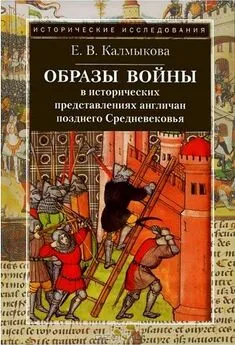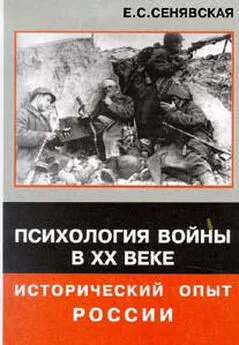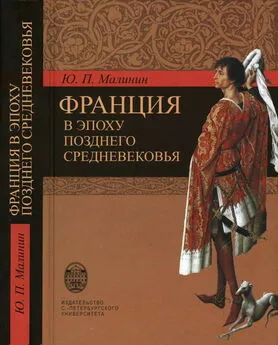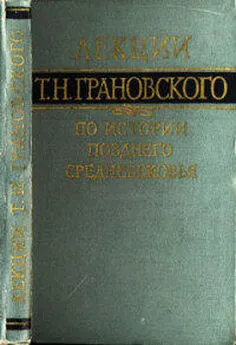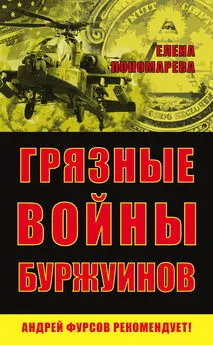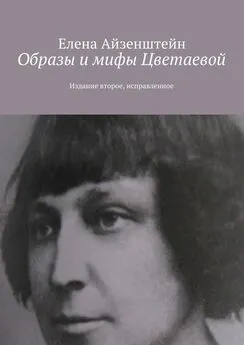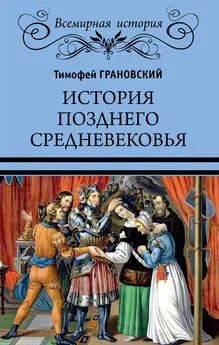Елена Калмыкова - Образы войны в исторических представлениях англичан позднего Средневековья
- Название:Образы войны в исторических представлениях англичан позднего Средневековья
- Автор:
- Жанр:
- Издательство:Квадрига
- Год:2010
- Город:Москва
- ISBN:978-5-91791-012-3
- Рейтинг:
- Избранное:Добавить в избранное
-
Отзывы:
-
Ваша оценка:
Елена Калмыкова - Образы войны в исторических представлениях англичан позднего Средневековья краткое содержание
Образы войны в исторических представлениях англичан позднего Средневековья - читать онлайн бесплатно полную версию (весь текст целиком)
Интервал:
Закладка:
One more change in the perception of military conflicts, outlined during the Late Middle Ages and further developed in the Modem period, consists in the idea of war as a "normal" element of foreign policy. During the 14th and 15th centuries, the interpretation of any war was traditionally accompanied by reasoning on human sins, divine punishment and the struggle for justice, but meanwhile there was already a tendency to understand military actions as a lawful way of defending national interests, as well as a logical and even "natural" way to achieve a given objective; a form of foreign policy only slightly more radical than diplomatic negotiations.
During the periods of extended foreign conflict when a community requires "proofs" of its hereditary superiority over the enemy, the interest of historians and other members of society in a heroic past invariably becomes stronger. The collective memory of the glorious events of national history is one of the most important factors of national self-consciousness. In the period of the Hundred Years' War, English collective ideas of the national past possessed a typical set of the characteristics inherent in ethno-political myths. Examples include identification of ancestors with a glorious ancient people; exaggeration of said ancestors' various achievements, etc. From its overall memory of the past, society selected the most vital and topical episodes of history, which in the course of time could fade into oblivion or receive new meanings. However, the mere fact of manipulation of history for propagandistic purposes does not testify to the maturity of national consciousness. There is a more important issue: any attempt to correct important community legends was unequivocally recognized as a discrediting and dangerous act, even as an encroachment on the sanctum sanctorum of that society, and demanded immediate refutation.
Besides the increased interest in myths about the past, it is important to note the mythologization of the present or the recent past so typical of military history. Mythologization of the leader or the hero plays a major role in a life of any community, especially during periods of crisis, promoting its rallying and mobilisation. Thus, a mythologized image of a hero becomes not only the object of veneration, obtaining certain sacral functions, but also an example for imitation, displaying concentrated positive characteristics. Similar processes can be observed not only in heroes of the past (e.g. King Arthur), but also in contemporaries (Robert Knollys, Bertrand du Guesclin, Henry V, Joan of Arc), who gradually lost the features of real persons in common perception and grew to become symbols with specific qualities.
Finally I would like to emphasize that in English historiography of the Central and Late Middle Ages, a canon was forming for narration of the past, constantly repeated and transmitted from generation to generation. English chroniclers "appropriated" the past of both conquered peoples (the Britons), and conquerors (the Romans, the Danes, the Normans), including it in the history of their own people and building a unified narrative within which the main focus was not on the history of the people, but on the history of the land; this narrative nevertheless plays major part in national consciousness. The mutation of the stories about relations with France during the reign of Richard II is significant in the light of the formation of this continuous history. The original resolute condemnation of Richard's foreign policy by contemporaries, in particular by Lancastrian authors, disappeared by the second half of the 15th century. The historical works of this period describe the end of the 14th century as just another victorious stage of the war, characterised by large-scale campaigns organized by the king in directions wholly traditional for English foreign policy (in France, Scotland, the Pyrenees and Flanders). This testifies to a certain unification of ideas of the English sovereign and of idealised images of victorious patriots.
Among the international conflicts scrutinized in this book, only wars for sovereignty over Scotland in the Early Modem period were directly connected to medieval campaigns. The English kings' rights for the French crown (declared until 1801) were already being perceived as no more than empty rhetoric during the reign of Henry VII. After 1453, English kings repeatedly began, and more often only threatened to begin, campaigns whose official purpose was to re-conquer the continental possessions of their ancestors. But in reality this was the least of the motives behind the wars waged by the Tudors and the Stuarts under the pretext of obtaining the French crown. That said, it is indicative that not only authorities but also common Englishmen constantly appealed to the renewal of the old war. In this case it is possible to see a traditional quest for justus casus belli alongside calls to repeat the achievements of one's ancestors and justify their sacrifices.
Whilst remaining in the distant past, the wars of the 14lh and 15lh centuries have received quite a different significance in English memory of the Modem and Contemporary periods than for their 15lh-century ancestors. The ideas of restoration of infringed rights and supreme justice, as well as of tangible material awards received by subjects of the English crown, and of territorial acquisition by the state all ceased to be important. For historical memory, so important for national consciousness, only the victories gained at Sluice, Crecy, Neville's Crosse, Poitiers, Najera and Agincourt are still significant, testifying not so much to the God's benevolence as to the individual military valour of the Englishmen who had been able to crush any and all opposition. Furthermore, current appeals to these victories have not only ceased to be accompanied by discussion of the causes and results of the wars during which they occurred, but on the whole are rarely directed towards kindling of patriotic sentiments in society. The heroic episodes of the Hundred Years' War have acquired a symbolic meaning, the interpretation of which is based on cultural tradition.
Хронологическая таблица
1291–1292 гг. — Великая тяжба за престол Шотландии.
Июнь 1291 г. — «Норемский дар»: признание сюзеренитета Эдуарда I Плантагенета над претендентами на шотландскую корону.
17 ноября 1292 г. — избрание Джона Бэлл иола королем Шотландии.
Декабрь 1292 г. — принесение Джоном Бэллиолом оммажа и клятвы верности Эдуарду I.
23 октября 1295 г. — подписание в Париже франко-шотландского договора о союзе.
27 апреля 1296 г. — битва при Данбаре. Победа англичан над шотландскими войсками. Начало шотландской Войны за независимость.
2 июля 1296 г. — пленение Джона Бэллиола и его отречение от престола. Вывоз в Англию Сконского камня и аннулирование парижского договора с Францией.
25 марта 1306 г. — коронация Роберта Брюса в Сконе.
20 апреля 1314 г. — смерть римского папы Климента V.
24 июня 1314 г. — битва при Бэннокберне. Победа Роберта Брюса над войсками Эдуарда II.
7 августа 1316 г. — избрание римским папой кардинала Жака д'Юэза, принявшего имя Иоанн XXII.
20 января 1327 г. — отречение Эдуарда II от престола в пользу сына, Эдуарда III.
1 февраля 1327 г. — коронация Эдуарда III.
31 марта 1327 г. — заключение «вечного мира» между Англией и Францией.
1 февраля 1328 г. — смерть Карла IV — последнего короля из династии Капетингов.
1 апреля 1328 г. — рождение дочери вдовствующей королевой Франции Жанной д'Эвре. Избрание Филиппа Валуа королем Франции.
4 мая 1328 г. — Эдинбургский мирный договор, ознаменовавший завершение шотландской Войны за независимость.
29 мая 1328 г. — коронация Филиппа VI Счастливого из династии Валуа.
6 июня 1329 г. — принесение Эдуардом III оммажа Филиппу Валуа за Аквитанию.
7 июня 1329 г. — смерть Роберта I Брюса, которому наследовал Дэвид II Брюс.
29 ноября 1330 г. — казнь обвиненного в государственной измене Роджера Мортимера, 1-го графа Марча.
Август 1332 г. — вторжение Эдуарда Бэллиола и «лишенных наследства» лордов в Шотландию.
24 сентября 1332 г. — коронация Эдуарда Бэллиола.
23 ноября 1332 г. — признание Эдуардом Бэллиолом Шотландии английским леном.
19 июля 1333 г. — битва при Хэлидон-Хилле. Победа Эдуарда III и Эдуарда Бэллиола над шотландцами.
Весна 1334 г. — прибытие графа Роберта III д'Артуа в Англию.
Май 1334 г. — бегство Дэвида II Брюса во Францию.
19 июня 1334 г. — принесение Эдуардом Бэллиолом оммажа за Шотландию и присяги на верность Эдуарду III.
24 августа 1334 г. — бегство Эдуарда Бэллиола в Англию.
Ноябрь 1334 г. — вторжение Эдуарда III в Шотландию.
4 декабря 1334 г. — смерть папы Иоанна XXII.
20 декабря 1334 г. — избрание папой кардинала Жака Фурье, принявшего имя Бенедикт XII.
Июль 1335 г. — военная помощь Филиппа VI Шотландии.
Июль 1335 г. — новое вторжение Эдуарда III и Эдуарда Бэллиола в Шотландию.
Зима 1336 г. — запрет экспорта английской шерсти во Фландрию.
Лето 1336 г. — поход Эдуарда III в Шотландию.
Август-сентябрь 1336 г. — нападение французских моряков на английские торговые корабли. Арест английских купцов во Франции.
6 сентября 1336 г. — приказ английским морякам атаковать французские суда. Арест французских купцов и их товаров в Англии.
Зима 1337 г. — пограничные англо-французские столкновения в Гаскони.
Май 1337 г. — объявление Филиппа VI о конфискации Гаскони.
Читать дальшеИнтервал:
Закладка:
